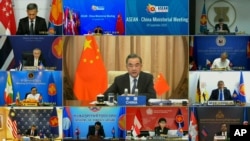China aims to push back against the United States by reopening talks with 10 Southeast Asian nations on a code of conduct that would help prevent mishaps in a crowded, disputed Asian sea, political scholars say.
Chinese Foreign Minister Wang Yi urged in August that the 10-member Association of Southeast Asian Nations bloc resume talks with his country toward a South China Sea code of conduct, state-controlled news media in China said. Wang told a symposium in Beijing this month that negotiators should try to finish the code “at a faster pace,” China Central Television reported online.
The minister’s calls followed charges from U.S. Secretary of State Michael Pompeo in July that Chinese claims in the sea are illegal and that Washington would help other countries that come under pressure from Beijing. China calls about 90% of the sea its own.
Beijing vies with sovereignty in tracts of the 3.5 million-square-kilometer sea with bloc members Brunei, Malaysia, Vietnam and the Philippines.
Ignoring code of conduct talks – popular in Southeast Asia and pending since the negotiating parties reached a related framework deal in 2002 – would put China on the bloc’s bad side and endear it to the United States, scholars believe. Talks broke down in 2019.
“The reason that I think the Chinese first agreed to the code of conduct was to block out the Americans, that the Chinese could say ‘we already established a track toward addressing the issues in the South China Sea, so the South China Sea is peaceful, and it is stable, so to the Americans, do not meddle,’” said Yun Sun, East Asia Program senior associate at the Stimson Center think tank in Washington.
Backed by the world’s third strongest armed forces, China has upset Southeast Asian countries over the past decade by landfilling some of the sea’s tiny islets, sometimes for military use. Claimants prize the waterway for fisheries and undersea energy reserves. The U.S. government has no claim in the sea but bristles when its rival superpower China exerts too much control over it.
Chinese officials worry about what the United States will do next, analysts believe. The two powers are already locked in trade, technology and consular disputes.
“I think China now really wants to finalize the code of conduct because the South China Sea right now could reach a boiling point any time now,” said Aaron Rabena, a research fellow at the Asia-Pacific Pathways to Progress Foundation in Metro Manila. “It’s really a major flashpoint between China and the United States, and China doesn’t want more tensions with the U.S.”
Southeast Asian countries are receptive now to both Beijing and Washington. But the Philippines, after a boat standoff with China in 2012, won world court arbitration against China in 2016 and Vietnam has considered filing its own case.
Countries that feel “hopeless” will “develop alternative channels to achieve what they want,” Sun said.
China and the bloc is better known as ASEAN agreed in 2017 to restart the talks and later set a completion goal of 2021. A code would be designed to prevent accidents that capsize fishing boats, a common occurrence, as well as deadly skirmishes such as the Sino-Vietnamese clashes of 1974 and 1988.
Negotiations have stalled over the years largely because of code content that would touch on sovereignty disputes. For example, it’s unclear whether wording would cover mishaps near Chinese-controlled islets, make certain clauses legally binding and set up an enforcement body. Taiwan, a sixth claimant to the sea, is excluded from the code talks but still uses the waterway.
ASEAN and China remain stuck on “details” in the code, said Huang Kwei-bo, vice dean of the international affairs college at National Chengchi University in Taipei.
But China figures that just the act of negotiating will keep Washington at bay, he said. “You could say it’s just an empty diplomatic move, but I think according to foreign relations that to negotiate is always better than not negotiating,” Huang said.
